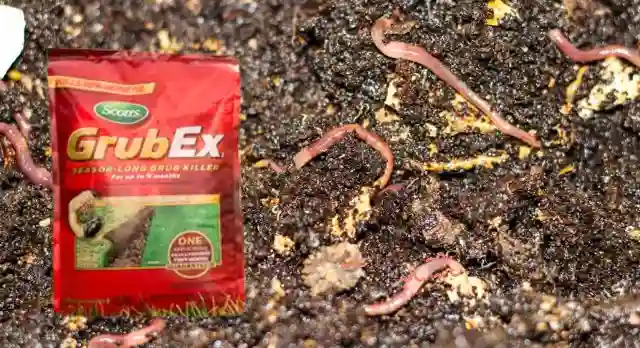Does GrubEx Kill Earthworms? Understanding the Impact
Earthworms play a crucial role in enriching and aerating soil. So it’s understandable if you’re worried about whether products like GrubEx, which kill lawn pests, also harm beneficial earthworms. This article will give you the facts on GrubEx’s effects on earthworms.
What is GrubEx?
GrubEx is a pesticide product designed to kill lawn grubs, especially Japanese beetle grubs. It contains the active ingredients chlorantraniliprole and trichlorfon.
GrubEx is applied as a granular formulation that you spread over your lawn. When the grubs come into contact with it in the soil, the pesticides are absorbed through their exoskeleton. This disrupts their muscle function, eventually causing paralysis and death
Do Earthworms Eat GrubEx?
Earthworms live in the soil and feed on organic matter like decomposing plant material. It’s possible they could ingest some GrubEx granules while burrowing through treated soil.
However, earthworms don’t actually eat the pesticide granules intentionally. GrubEx doesn’t contain any food material that would attract earthworms.
The bigger concern is whether GrubEx has toxic effects on earthworms after accidental ingestion.
Does GrubEx Kill Earthworms?
The short answer is no, GrubEx does not directly kill earthworms.
Here’s a more detailed look at the evidence on GrubEx’s safety for earthworms:
- EPA toxicity data – When approving pesticides for use, the EPA requires toxicity studies on birds, fish, and invertebrates like earthworms. According to the GrubEx label, toxicity studies show that the product is “practically non-toxic” to earthworms.
- Active ingredients – The two active ingredients in GrubEx, chlorantraniliprole and trichlorfon, have low toxicity to earthworms when used at normal application rates, according to pesticide toxicity databases.
- Field earthworm counts – Research studies have monitored earthworm populations in turf treated with grub insecticides, including chlorantraniliprole and trichlorfon. When used as directed, the insecticides did not reduce earthworm numbers compared to untreated turf.

Can GrubEx Harm Earthworms Indirectly?
Although GrubEx doesn’t directly kill earthworms, some people claim that killing grubs reduces the earthworm’s food supply. The logic is that fewer grubs might mean less food available in the form of dead grubs for earthworms to eat.
However, research has found this is not a major concern. Earthworms are versatile scavengers and can feed on various organic materials like plant debris and microorganisms. Dead grubs make up a very small portion of an earthworm’s diet.
Eliminating grubs may change the soil ecosystem in various ways. But there’s no evidence it indirectly harms earthworm populations by limiting their food supply.
Tips to Protect Earthworms When Using GrubEx
While GrubEx is considered earthworm-safe when used as directed, you can take some extra precautions to avoid potential issues:
- Apply GrubEx at the recommended rates – don’t overapply.
- Water the product in well after application to minimize surface exposure.
- Avoid spreading near known earthworm concentrations like mulch beds.
- Apply lime or compost after treatment to balance soil pH.
- Check for earthworms digging near the surface after applying GrubEx. This may indicate they are trying to avoid the treated soil, in which case it’s best to water again to move the pesticide down into the soil profile.
Related Guide – Does Merit Kill Earthworms?
Key Takeaway
- GrubEx does not directly kill earthworms when used as directed, according to EPA toxicity data, research on the active ingredients, and field studies monitoring earthworm populations.
- There is little evidence that eliminating grubs indirectly harms earthworms by reducing their food supply.
- Simple precautions like proper application rate, watering in, and avoiding worm beds can further minimize any potential risks to earthworms.
With a little care, you can have both a thriving earthworm population and a grub-free lawn with GrubEx treatment. Understanding the science behind the product gives you confidence that your soil health will remain strong.
Related Guide – Does Bifenthrin Kill Earthworms?
Will GrubEx harm earthworms?
Yes, GrubEx can harm earthworms. The chemicals in GrubEx, such as imidacloprid, can be toxic to earthworms and affect their nervous system, potentially causing paralysis or death. This can disrupt the soil ecosystem and impact soil health.
What grub killer is safe for earthworms?
If you want to control grubs without harming earthworms, there are several grub killers that are considered safer options. One such option is using biological controls like nematodes, which are microscopic organisms that specifically target grubs while being safe for earthworms and other beneficial organisms in the soil.
How do you kill grubs without killing earthworms?
To kill grubs without harming earthworms, you can consider using natural methods and cultural practices. These include practices like maintaining a healthy lawn through proper watering, mowing, and overseeding. Additionally, biological controls like nematodes can be applied to target grubs specifically without harming earthworms.
What does GrubEx kill besides grubs?
GrubEx is primarily designed to target and kill grubs, which are the larvae of certain beetles. However, it’s important to note that the chemicals in GrubEx can also affect other soil-dwelling organisms, including earthworms. Additionally, by reducing the grub population, it indirectly impacts the food source for other animals, such as birds, which rely on grubs for their diet.
